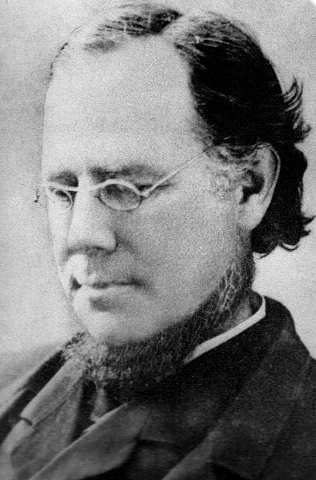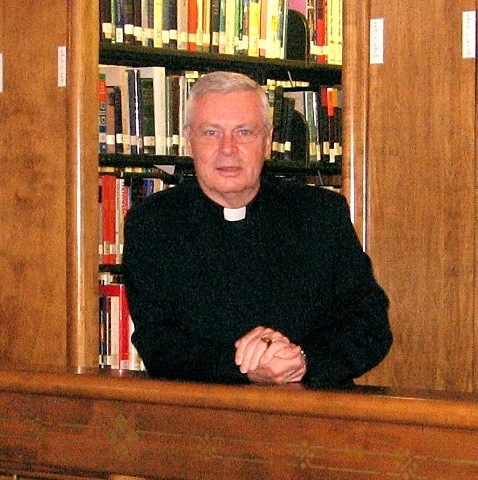December 10, 2012
This is the thirty-fourth in a series of previously unpublished reflections from the 1854 spiritual notebook of Paulist Founder, Servant of God Father Isaac T. Hecker. The reflection series is being made public in conjunction with Father Hecker’s cause for canonization. Father Paul Robichaud, CSP, Paulist historian and postulator of Father Hecker’s cause, is coordinating the materials and offers a response to each entry.

He who is not in his place in the order of things established by God will see all things in disorder. Being in one’s place in the order of grace is humility. Humility therefore is necessary for science and true wisdom. Science is the knowledge of how things are related and wisdom is the contemplation of ultimate causes.
Nothing can be said to be thoroughly known until we find out its cause. So the one who is ignorant of God; who does not recognize God in His creatures and creation; understands nothing. The value of time is unknown to the one who does not know God; for he will never judge and esteem things at their true value. Ignorance is the effect of this intellectual blindness caused chiefly by pride, Humility is the antidote to pride and restores to the soul the light of God, in and by which we see all things as they are and in their true relationships.
“What does he know who has not suffered temptations,” says the Apostle (1 Corinthians 10:13). Temptations reveal who we really are and thus teach us humility. St. Augustine says, “Let me know myself as you know me.” Only the one who knows God can be truly wise according to the words of St. Thomas (Aquinas) “Man, when he regards absolutely the things that God is to say, the highest cause of the whole of the universe, is called wise.” We are truly wise when we arrive at the knowledge that we are fools and truly learned when we acknowledge that we are ignorant.
Does what surrounds us mean more than it seems? Will everything pass away and leave no trace that it had been here? O Lord, you are all and everything else is nothing. We have no other lesson to learn than this: “ I beheld the earth and it was without form, and the heavens and there was no light in them.” (Jeremiah 4:23)

Wisdom literature in the Old Testament developed after the exile when Jews now far away from Jerusalem sought to be faithful and so began to compile instruction for retaining Jewish identity. Wisdom consisted in how to act and how not to act in various situations based upon lived experience. God operated through the laws of nature and society, rewarded the good and punished the bad in the afterlife. In the New Testament Jesus the teacher is the personification of wisdom, like the rabbis of wisdom literature, Jesus teaches how his disciples are to act and not act and in the New Testament this is done in love. Saint Paul also adds his own understanding of his preaching of the cross of Christ which is the wisdom of God but seems like foolishness to his Greek Roman world.
In modern usage, wisdom means perfect understanding and is tied to science, culture and philosophy. To be wise is to draw across these disciplines to lead a happy and successful life. How to act and how not to act, remains at the core of wisdom as it is understood over the centuries. For Servant of God Isaac Hecker, living in the 19th century wisdom had another dimension, that of contemplation. For Hecker God was at the center of all creation, value and virtue and at the heart of all serious study. Hecker’s love of contemplative prayer fit perfectly into his understanding of wisdom. God is the source of all truth and knowledge, so to focus on God’s presence is to direct one’s attention to the source of all wisdom. Hecker equates wisdom with holiness. The first step is found In humility where one recognizes their need for God, By approaching God with an open heart one has the capacity to grow in wisdom and holiness through contemplative prayer. For Hecker you find wisdom when you find God and because God is accessible, so is wisdom.
About Father Isaac Hecker’s 1854 Spiritual Notebook
Servant of God, Father Isaac Hecker wrote these spiritual notes as a young Redemptorist priest about 1854 and they have never been published. Hecker was 34 years old at the time, and had been ordained a priest for five years. He loved his work as a Catholic evangelist. The Redemptorist mission band had expanded out of the New York state area to the south and west, and the band’s national reputation grew. Hecker had begun to focus his attention on Protestants who came out to hear them. To this purpose Hecker began to write in 1854 his invitation to Protestant America to consider the Catholic Church, “Questions of the Soul” which would make him a national figure in the American church.
Hecker collected and organized these notes that include writings and stories from St. Alphonsus Liguori, the Jesuit spiritual writer Louis Lallemant and his disciple Jean Surin, the German mystic John Tauler, St. Thomas Aquinas and St. Jane de Chantal among others. These notes were a resource for retreat work and spiritual direction and show Hecker’s growing proficiency in traditional Catholic spirituality some ten years after his conversion to the Catholic faith. They are composed of short thematic reflections.